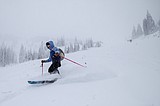Resort tax revision would allow funding of workforce housing
KATE HESTON | Hagadone News Network | UPDATED 2 years, 10 months AGO
Kate Heston covers politics and natural resources for the Daily Inter Lake. She is a graduate of the University of Iowa's journalism program, previously worked as photo editor at the Daily Iowan and was a News21 fellow in Phoenix. She can be reached at [email protected] or 406-758-4459. | February 22, 2023 1:00 AM
A bill that would revise Montana’s resort tax laws by increasing the population cap and allowing for a percentage of the tax to go toward workforce housing was presented to the state Legislature last week.
Sponsored by Rep. Dave Fern, D-Whitefish, House Bill 370 would increase the population of an unincorporated resort area to 3,500, a 1,000-person increase from the prior limit, while requiring an incorporated resort community to have a population of less than 5,500.
During the last legislative session, the maximum rate a resort community could tax increased from 3% to 4%, with revenue from the additional 1% limited to infrastructure needs. Fern’s legislation would allow those additional funds to go toward workforce housing.
Workforce housing, as defined in the bill, means rental housing for which 20% or more of the units are rent restricted. At the House Taxation Committee hearing, Fern said that the percentage could be amended.
“This bill recognizes population growth and the need to increase the supply of housing in the state,” Fern told the committee.
Currently, there is a 3% resort tax in Whitefish and Columbia Falls. The tax is on restaurant food, drinks, hotel stays and other lodging, and certain luxury items defined by city code.
Whitefish collected nearly $4.3 million in resort taxes during the 2020-21 fiscal year.
Dana Smith, the city manager of Whitefish, said the city supports HB370 because it allows eligible communities the opportunity to make decisions regarding their own housing needs. In a letter to the House Taxation Committee on Feb. 6, the city said that the bill will especially help “those that are facing an exacerbated housing crisis from the pandemic like the small mountain town of Whitefish.”
The letter noted that Whitefish’s resort tax has garnered support from voters since its creation in 1996.
“Should House Bill 370 pass, there would be no immediate impact to the resort tax in Whitefish since any changes require voter approval,” Smith said in an email to the Inter lake. “However, this bill does provide the opportunity for future consideration by the City Council and determination by voters whether or not resort tax should be increased by an additional 1% for infrastructure or affordable housing.”
Smith said the City Council began preparing options last year for a ballot question that could be presented to voters in November to determine if affordable housing should be included in the uses for the revenue received from the 3% resort tax starting in 2025.
Susan Nicosia, the city manager of Columbia Falls, said the city also supports the bill.
“As a city who has seen first-hand the positive effects of the resort tax and allocating the cost of providing services to non-residents who impact those services, we support Rep. Fern’s amendments,” Nicosia said in an email.
The bill had a handful of proponents and no opponents. Darryl James, executive director for the Montana Infrastructure Coalition, said the bill is a means to continue to provide sound infrastructure investments.
“We need to provide local communities with the tools they need to keep up with their basic infrastructure,” James said in his testimony to the House Taxation Committee.
Rebecca Meyers, the executive director of the Montana Economic Developers Association, also testified on behalf of the bill. According to Meyers, smaller communities struggle when they don’t have full staffing abilities. She supports the bill as it may help with talent attraction and business retention in the state.
Another proponent, Ann Schwend with the sustainable communities program through the Montana Environmental Information Center, spoke to the importance of workforce housing. She pointed out that many people who cannot live in the communities they work in have to commute, sometimes long distances.
“That is not what we think about in terms of a sustainable community,” Schwend testified.
There were a few questions from the committee about the bill, many directed for the sponsor himself. Fern clarified that resorts do not necessarily have to provide workforce housing if the extra 1% is implemented.
Whitefish currently remits 25% of resort tax revenue to landowners in the form of property tax credits, and businesses keep 5% to cover administration costs. The remaining 70% goes toward infrastructure and pay off debt on a conservation easement for the Haskill Basin.
If the city did implement the extra 1%, according to Fern, that amount could be used by the Whitefish Housing Authority with government jurisdiction for workforce housing, or it could go to another infrastructure project.
ARTICLES BY KATE HESTON

Veteran-owned mobile boat repair service anchors down in the Flathead Valley
The Kramers launched Flathead Mobile Marine to use their skills — they have decades of experience performing routine maintenance checks on a variety of boats as well as working with engines and electrical systems — and help boaters in the community.

With ski season near, resort reaches deal with staff
After 18 months of negotiations, Whitefish Mountain Resort executives and the resort’s ski patrol union are finalizing a one-year contract for the upcoming season.

Trapped in a car wreck, Woods Bay woman credits teens with saving her life
Driving home from a quilting event in Bigfork in September of last year, Carol Martin remembered that the sky was clear, the sun was shining, and she had a headache.
